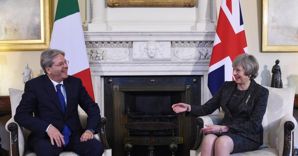Trump, a two-speed Europe, and Greece; while the subject to considerable debate inflamed the squares. Fell in a particularly delicate moment of the meeting between the president of the Ecb Mario Draghi and German chancellor Angela Merkel. Covered in a secret impenetrable, as always, the meeting dedicated to the state of the Eurozone, however, appears to mark a change of course in relations between Germany and the central bank, in the past few days rather difficult. In the evening, the chancellor, while emphasizing not want to comment on the meeting, has made an important clarification on one of the themes: “I Would like to clear the field,” he said, on a misunderstanding arose over Europe at different s peeds. Already exists, because for example not all the Countries of the European Community adhering to the euro. But it is not true that I have spoken of different speeds with respect to the Eurozone, and indeed the euro area must be cohesive and continue to support all projects undertaken along with how the bailout fund. Instead, he continued, you can, within the Eu, have areas where there can be enhanced cooperation, as recently proposed by Denmark on justice. However, these projects should be open to all, it is not feasible that the three-Member sit, decide, and go forward alone, leaving the others outside.”

Gentiloni open to the Eu with two speeds: “answers to difficulties”
it Is undeniable that, in view of the meeting yesterday, and the tones are offers. On Wednesday, Finance minister Wolfgang Schäuble said: “there is an art to prepare and plan for an exit from a monetary policy extraordinary, in order to prevent large distortions”. And he added: “I Am happy that the Ecb’s attempts to adopt a monetary policy that is prudent and carefully balanced”. The same day, the president of the Bundesbank, Jens Weidmann – jealous of the independence of "its" central bank, but the expression of the same political and cultural world of Schäuble and Merkel – has explained that it is too early for the Ecb to think of scaling down the monetary stimulus because inflation, which has reached 1.9% in Germany, is mainly linked to oil prices. Were not so conciliatory tones only a few days ago. On the 25th of January, for example, Weidmann had argued that the requirements for exit from the Qe were alm ost reached, while the 13 January Schäuble had pushed for an exit strategy this year.

The record of the German surplus leads to greater confrontation with the United States of Trump
Something has happened in the meantime: the attack on Germany and the euro of the entourage of Donald Trump. In the latter case, the words of the president of the new National Trade Council, Peter Navarro, who has accused Germany of maintaining undervalued the euro to increase its trade surplus.
The response has been twofold: the political world of the German first recalled Navarro – professor of economics – that the decline of the euro is the effect of the monetary policies of the Ecb, an independent institution that takes care of the interests of the whole of Euroland, and not of German policy. At the same time, he defended the Ecb from any possible attack coming from over the ocean. It is in this key that must be read the last words of Schäuble: “The euro exchange rate, strictly speaking, it is too low for the competitive position of Germany.” “When Mario Draghi has launched an expansionary monetary policy, I said that this would have pushed up the German surplus,” he added, with a phrase that finds full meaning in the data, yesterday on the surplus record.
there Is no doubt that this small turn in rhetoric was made possible by the fact that in Germany the traditional parties, populist, are more solid than elsewhere. Populism – in an election year (the Netherlands, France, and Germany) – it remains a central theme, and it is likely that in the meeting, we also talked about the official declaration, on the occasion of the 60th anniversary of the Treaties of Rome, which must relaunch the european integration. We discuss if and how to insert in the text the idea of a Europe of variable geometry involving different processes of integration in different countries and sectors. The monetary institution is probably favourable to this commitment – as long as it doesn’t affect the unity of the monetary Union, of course – while Berlin has to find a equilbrio between the urgency of strengthening the euro area and the desire to maintain the unity among the member Countries of the Eu.
The position of Dragons, summarized at the beginning of the month, in Ljubljana, underlines how the financial crisis, economic and debt of recent years has contributed to an institutional framework is not strong enough. “There have been many important steps to remedy these difficulties, in particular the establishment of the banking union,” said the central banker – but this project is still incomplete.” “We are separated a certain distance from the completion of the monetary Union, i.e. a union in which the countries take collective responsibility for the euro area in the context of common institutions”.
The explicit position is reached while the european Commission has promised to publish on the occasion of the celebrations of 25 march in Rome, a report on the state of health of the Union, suggesting possibly new avenues for strengthening the integration. At the centre of discussions of the executive community, there are also the recent proposals of Mario Monti to promote new own resources in the Eu budget.
Very likely, finally, that Draghi and Merkel have addressed the issue of Greece. The reforms that Athens are incomplete, Athens encounter some difficulty policy vararle, while the Imf seems to take over surplus tax – a position the more soft of the Commission and the Ecb.
© Reproduction reserved
No comments:
Post a Comment